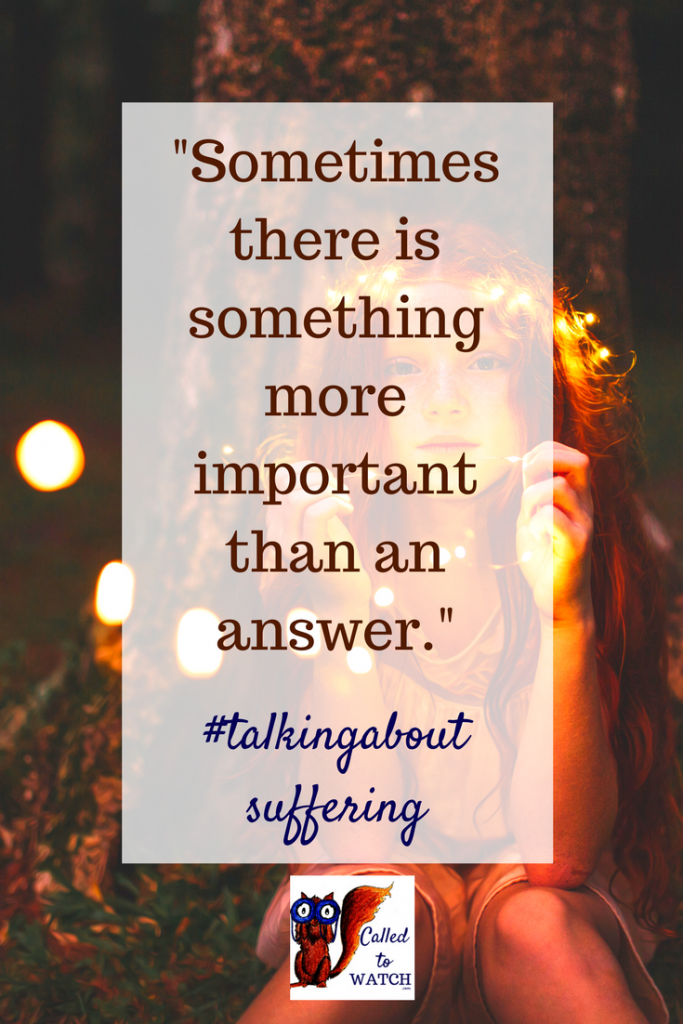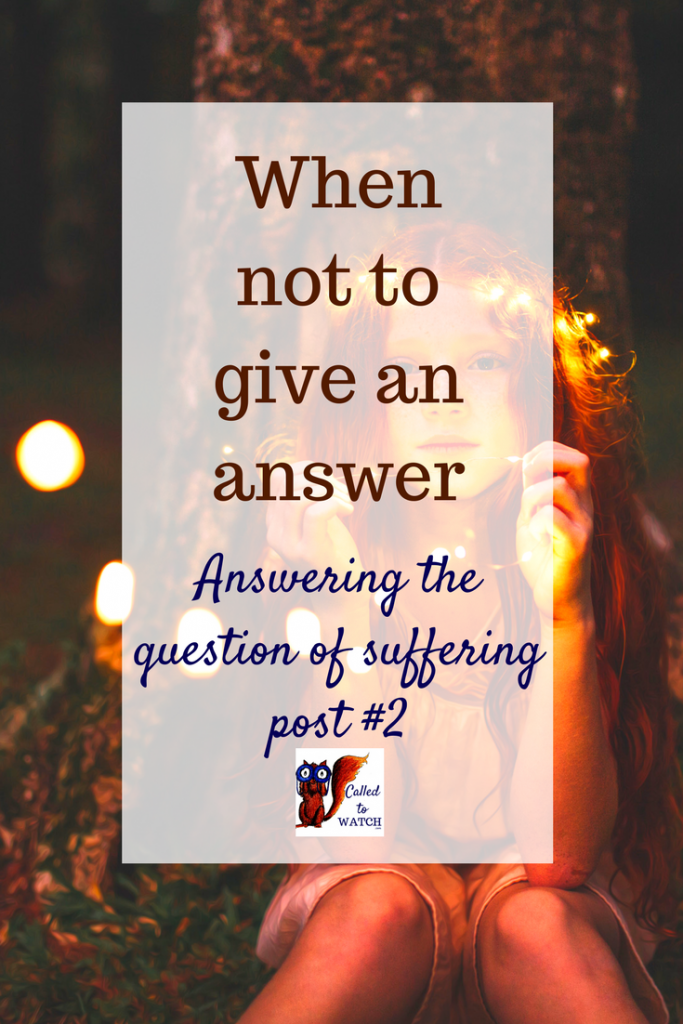No, the only reason you should not answer a question is when you have something to offer that is more important.
But what’s more important than an answer?
Talking about suffering: When not to answer the question
Let’s go back to my friend from the last post. She’s struggling from a mental illness which invades her days and eats away at her personality.
Upset and tired she asks me,
‘Why does God allow this?’
Now there is an answer I can give to this. It is a theologically sound answer.
It is correct in every sense of the word. And there’s nothing wrong with my motives – I love my friend, and want to see her comforted and at peace with God and herself.
All the boxes are ticked… and yet depending on the situation my answer could be extraordinarily hurtful to her. And yet, it might not be!
How do I know?
Three things to consider before giving the right answer:
In situations like this (and how difficult they are!), there is a lot to consider. Here are three of them.
1. Is there history?
Have I had conversations about faith with my friend? Does she profess to be a Christian, or is this question coming from a person who is still living in rebellion against their King? If I gave her the ‘right’ answer, would it be a new concept, or simply a reminder of what she already knows?
Has this question come out of the blue or is a culmination of a long period of agony or searching?
2. Do they mean the question?
We don’t go around offering answers if no one’s asked a question. That’s just common sense, not to mention common courtesy! And I think it’s easy for us to look at people who are suffering and assume they’re asking questions and assume we can answer them.
But sometimes if we really listen, they may not actually be asking questions at all. If someone tells us the facts about the hardships of their day and we respond with ‘God has a plan’, perhaps we are answering a question they haven’t actually asked.
We also need to consider the reality that sometimes the verbal question isn’t the real question. Or something that sounds like a question isn’t a question at all. For instance, how often on a hot day do we ask ‘why is it so hot?’ or we ask ‘why isn’t computer working?’ and what we’re really asking is not, ‘why it is broken’, but what is broken and can someone please fix it.
Of course we should never assume we know what someone is ‘really’ asking – we’re Watchers, not mind-readers! – but it’s helpful for me to consider whether my friend is actually asking the question I think she is.
3. Do we need to answer?
Most of the time we like answering questions. It makes us feel important, knowledgeable, and most of all useful. And that is something that as Watchers we often struggle with, so it’s always encouraging when we can actually do something.
Sometimes people are genuinely looking for the theological answer to a practical question. Sometimes questions need answers – but sometimes they need something else. A listening ear, or a nudge towards the right response.
After all, the answers that stick with us and mean the most are very rarely the ones that are spoon-fed to us. I know in my own life the truths that I value the most are the ones I fought hard for, that I pursued and questioned and jabbed and eventually received.
Is answering my friend’s question the best way I can serve her?
“THE ANSWERS THAT STICK WITH US ARE THE ONES WE DISCOVER BY OURSELVES.”
There’s nothing ‘black and white’ about questions and answers – and that’s okay!
Figuring out when to give the right answer is hard. It’s important to remember that there are no fixed rules because people are not fixed!
And so, a sentence may mean one thing one day and something entirely different the next. Morning might be the good time for a chat one day, and the completely wrong time a week later.
Everything above is only a guide, and the only principle that cannot be ignored is the command to “Love one another”.
In the end it’s not up to us. It is God who prepares hearts to accept “right” answers, and gives tongues right answers to say. We will make mistakes, both consciously and unconsciously. We will try and fail, and other days we won’t try at all.
More important than the right answer is the right posture – and that is kneeling at the feet of Jesus beside our Loved One and praying for wisdom and mercy.
In the case of my friend, instead of leaping to answer her visible question, I think I am going to prayfully and humbly ask her a few more questions…
//Do you ever struggle with when to answer a question? Are any of these principles helpful? I’d love to hear from you!
This is the second in a series of posts titled Talking about suffering. The first one was called: When pure motives don’t make things right.
PS: Enjoyed the post above? Get the next one delivered straight to you! Sign up for email notifications
I’m also on Facebook, Pinterest & Twitter! Meet me there for more interesting reads, resources and community.



